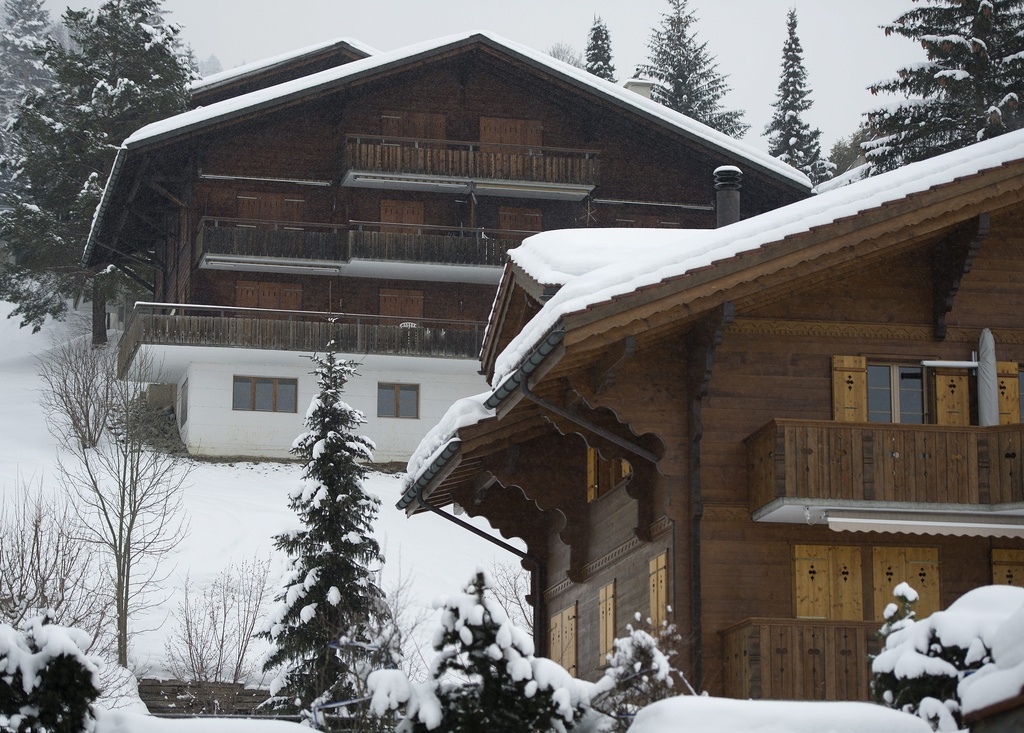Vote issues fail to ignite emotions

Support for a proposal to limit the number of holiday homes appears to be weakening ahead of a nationwide ballot on March 11, according to a representative opinion poll.
Researchers also found that the campaign in the run-up to the vote has been lackluster as citizens struggle to make up their minds on this and four other issues.
Compared with a previous poll in January, backing for an initiative by a prominent environmental group and centre-left parties has dropped by nearly ten per cent.
The decline is attributed to a notable change of heart by more conservative citizens and in mountain resort regions, which would bear the brunt of a 20 per cent cap on holiday homes.
“If the initiative is rejected on March 11 it will be because increasing opposition has spread to rural regions in general and because of the centre-right and rightwing parties,” said Claude Longchamp of the leading gfs.bern research and polling institute which carried out the survey.
However, Longchamp cautions that the findings are not to be taken as forecasts for voting day. “A lot can still happen in the remaining days of the campaign,” he added.
Nine out of ten respondents appear to have made up their minds on a proposed limit to holiday homes, pitting environmental reasons against economic and federalist arguments.
But less than 20 days before the vote, the survey leaves researchers doubting whether the campaigns by supporters and opponents have had much impact.
Opinion making
Predictions are considered even more difficult for three other topics on the ballot sheet: a proposal to re-introduce a fixed book price agreement, tax breaks for prospective home owners and a plan to ward off foreign competition for Swiss casinos and lotteries.
“The process of opinion shaping is still underway, or has yet to begin,” said Longchamp.
Voters only seem to have a clear attitude towards an initiative by trade unions for a six-week statutory annual holiday. Opponents had a 16 per cent lead back in January and they have succeeded in nearly doubling the margin a month later.
The unusually high number of issues at stake is being blamed for the half-heartedness of the vote campaign and the lack of strong emotions.
Overwhelmed
Drawing a comparison with ballots in California and with one in Switzerland in 2003, when voters had the final say on a total of nine issues, Longchamp questions the benefits for democracy.
“Citizens tend to be overwhelmed and lean towards simplifications and blanket votes in such cases,” Longchamp said.
It is a view not necessary shared by Michael Hermann of Zurich University.
“Five issues are manageable for a citizen,” he argues, adding that a wealth of votes at a federal, cantonal and local level tend to put people off.
Longchamp’s research team for its part says the current political climate is marked by a certain lethargy following the parliamentary and cabinet elections last October and December respectively.
Contrary to the 2003 record vote there has not been the same sharp party-political antagonism in the current campaign, according to Longchamp.
Regardless of the perceived tameness of the political debate, turnout for March 11 is expected to reach average levels of around 41 per cent. In the ballot in 2003 voter participation climbed to nearly 50 per cent.

More
People’s initiative
The pollsters interviewed 1,411 Swiss citizens across the country for the second of their two representative surveys ahead of March 11.
Swiss expatriates could not be included in the poll.
The interviews took place 19 days ahead of voting day.
The margin of error is 2.7%.
The survey was commissioned by the Swiss Broadcasting Corporation, swissinfo’s parent company, and carried out by the GfS Bern research and polling institute.
A total of five issues are at stake on March 11 in the first of a series of nationwide votes this year.
Voters are to decide on an initiative by trade unions for a minimum six-week annual holiday.
They will also have the final say on a proposal by an environmental group to cap the number of holiday homes at a local level across the country.
A separate initiative seeks tax breaks for future home owners.
A referendum is also being held on a decision by parliament to re-introduce a fixed book price agreement.
Plans to enshrine in the constitution regulations on casinos and lotteries as well as prevention efforts for addiction also feature on the list.

In compliance with the JTI standards
More: SWI swissinfo.ch certified by the Journalism Trust Initiative















You can find an overview of ongoing debates with our journalists here . Please join us!
If you want to start a conversation about a topic raised in this article or want to report factual errors, email us at english@swissinfo.ch.